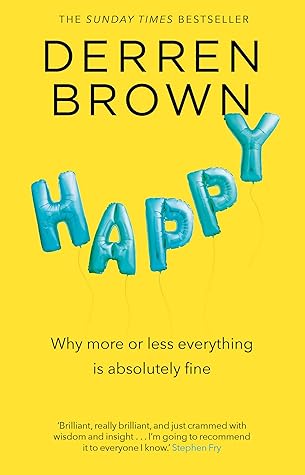More on this book
Community
Kindle Notes & Highlights
by
Derren Brown
Read between
December 27, 2020 - May 16, 2021
‘What upsets people is not things themselves but their judgements about these things.’
Confirmation bias occurs when we notice things in the world that support our beliefs and pay less attention to things that contradict them.
It’s just, usually, it’s myself that I wish I could get away from. Seriously, think about this. I have never been anywhere that I haven’t been. I’ve never had a kiss when I wasn’t one of the kissers. You know, I’ve never gone to the movies when I wasn’t there in the audience. I’ve never been out bowling, if I wasn’t there, making some stupid joke. That’s why so many people hate themselves. Seriously. It’s just they are sick to death of being around themselves.
‘You need a change of soul, not a change of climate.’
Is it not potentially just as disastrous to live one’s life with the goal of dying happily and without regret, just to find that our regret is that we did not live for the moment while we could?
we don’t make decisions based on our experiences. We make them based on the stories of our experiences. And we don’t form our stories based on an accurate reflection of experience. We form them like novelists, and we look for a good ending.
‘Everything we need is easy to procure, while the things we desire but don’t need are more difficult to obtain.’
‘Do not spoil what you have by desiring what you have not; remember that what you now have was once among the things you only hoped for.’
If you are pained by external things, it is not they that disturb you, but your own judgement of them. And it is in your power to wipe out that judgement now.
In essence, we make a judgement about the event and then react to that verdict.
‘Everything can be taken from a man but one thing: the last of the human freedoms – to choose one’s attitude in any given set of circumstances, to choose one’s own way.’
WE ARE to take responsibility for the ways in which we respond to external events.
learn to desire what you already have, and you will have all you need.
Ambition means tying your well-being to what other people say or do. Self-indulgence means tying it to the things that happen to you. Sanity means tying it to your own actions.2
We need to be able to step back and recognise when we are making choices as to how to behave or think, or acknowledge when an unhelpful choice has been made and supply counter-arguments to remedy the situation.
I am responsible for how I feel about external events. What am I doing to give myself this feeling? Is this thing that’s upsetting me something which lies under my control? If not, what if I were to decide it’s fine and let it go?
‘You will become way less concerned with what other people think of you when you realise how seldom they do.’
What is in our control and what is not? Where, today, are we in danger of letting ourselves down and acting in a way that we would later regret? What are the alternatives, which we can mentally rehearse now and more easily employ when the time is right? Are we setting ourselves up for a fall? Demanding too much of others? Working with unrealistic expectations? How might it be absolutely fine if things don’t go as planned?
So we need wait only long enough to consider our phrasing and take responsibility for our feelings. To wait so long that we never bring up our concerns is likely to do both parties a disservice. Expressing our unhappiness in a sensitive way is one of the most productive things we can do in a relationship.


